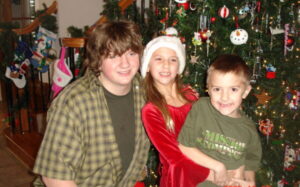Autism Family Support: 5 Ways For A Happy Household
Does having autism affect the dynamics of a family? That is something that most parents think about when they find out at least one of their children has autism. And the answer is not straightforward because it depends on a number of factors.
Those may include autism family support, how significant the needs are of the individual with autism and whether it creates major lifestyle changes for everyone, and if the family has the resources, time, and patience.
Autism family support, education, and encouragement makes a tremendous difference in the achievement of a happy household. Group therapy, parent support groups, and autism organizations can help families connect and thrive.
When writing my blog, I can’t speak for anyone’s upbringing and level of autism family support besides mine. I am not autism-trained; I am a person with autism.
So, please understand my opinions may differ than others. I just hope to create additional awareness, understanding, and compassion—things I reference often.
My Autism Family Support Structure
I grew up in a two-parent household, which made me luckier than some from the start. I know that it could be more of a challenge if there is only one parent to assist with any special needs or differences.
I was the youngest of three siblings. My brother is older than me by 9 years and my sister is just 23 months older.
Because of that major age span, I remember my childhood more with hanging out with my sister. She was a special part of my family autism support.
Since my brother was so much older, it was kind of hard for us to relate to one another because when I was born he was already in school, had his friends (a lot of them), and was in numerous activities.
The Baby of the Group and Autism Family Support
As I have mentioned in other blogs, when I was little I was very quiet. I still am, but not as much.
My oldest brother was very outgoing with friends over all the time, and they were loud and always running around and getting into things. There always seemed to be friends over, and they always seemed to be playing video games and eating.
My sister was strong willed, my parents say, but she was very protective of me. She was like a second mom in some ways. She wasn’t as outgoing as my brother, but there was typically someone over a lot of times.
Lucky for me, these friends became an extended circle of autism family support.
Because I was quiet, and because I had a speech delay making it harder for some people to understand me, my sister spoke a lot for me on my behalf, whether I wanted it or not.
Because she could easily understand things I said or wanted, she would say, “Connor wants this” or “Connor says he wants chicken nuggets.” I don’t remember all the details, but my folks say she would also sometimes get what “she” wanted to say it was what “I” wanted.
She and I played together and she was very good about including me in her activities. That means I did things I probably never would have otherwise and which contributed to a positive autism family support experience.
However, in hindsight, I think my sister’s desire to protect me and speak for me wasn’t a good thing overall. That’s because it prevented me from becoming more assertive in expressing my needs and wants.
I was very easy-going and passive, really, and more than happy to let my sister take control. She made good choices for me, but her speaking up for me most likely delayed me from becoming a more well-developed neurodiverse person mentally.
Jump to the present, and I managed to get myself back on track toward becoming the person I want to be. And, I am still easy going, patient, and tend to be quiet still. But I definitely speak up for myself and my wants and needs.
Today, my autism family support looks different because we are all adults. But those childhood years were so important.

I do think about how things might have been different if I was the oldest, or the middle child. Whatever your birth order, it’s not like you can change it or anything.
But it certainly can have an influence on how you interact with your siblings and parents and overall autism family support.
It could also be a factor in independence and ambitions. I find birth orders and how a personality can be shaped by it interesting.
On Reflection of My Autism Family Support
My parents have told me that in looking back, my sister speaking for me frequently was actually a flag for having autism. Of course, having a speech delay was as well. Therapists initially thought I had apraxia, but I wasn’t diagnosed with autism spectrum disorder until middle school. I was actually given the diagnosis of Asperger’s syndrome, which has since been rolled into the overall “spectrum” category.
(Learn more about why autism and apraxia share common ground.)
Everyone always thought it was cute that she was the “little mommy” to me, but I grew complacent about using my own voice for too long.
I’m still super close to my sister (and hope she feels the same) as well as my older brother, and appreciate all they did for me in terms of looking out for me and helping me on my path to adulthood. Of course, I only have positive experiences about what my parents did for me as well. So, thank you family!
5 Ways to Strengthen Autism Family Support:
Here are my my top 5 tips on building a stronger and happier family through autism family support when one (or more) individuals is on the spectrum.
- Encourage the child to speak up for themselves and to use their own words without assistance.
(Again, I have to say that this only applies if you have a child who does speak at least some and is mentally and physically able to express himself. I am not speaking for everyone on the spectrum and know there are many autistics who are non-verbal.)
Create some boundaries with siblings. A parent knows their children better than anyone, and they can think about ways to nurture a sense of independence in a child with autism. Even well-intentioned siblings can slow down progress.
Autism family support members need to know and understand that the journey toward independence also means failure along the way. It is hard to watch someone not succeed, especially if they have some extra challenges in life, such as autism, or something else. But, the struggle can yield great success. I am thankful my experiences have resulted in a stronger sense of self-awareness for my personal growth.
Figuring out doing things for themselves can help a person be the best version of themselves when they grow up. Resist the tendency to favor activities that are only suited for a child with autism. Of course the one with autism may have particular likes and dislikes. But the other siblings have favorite activities as well, and the best plan is to create family dynamics that allow positive co-existence and shared memories for everyone.
Do have open and transparent conversations with the entire family about autism and what it may, or may not, impact the one with autism. Be sure to have regular and honest talks about it and as much as possible, do so as a family. My parents were always very open about my being neurodivergent and I believe it helped me to understand that I may be “different,” but I am not in any way “less than.”
Individuals with autism face many more challenges beyond autism family support. Luckily, there are innovative strategies for triumph over these and other obstacles.
(Learn more about my growing up autistic and how I overcame challenges.)
Additional Challenges Individuals with Autism Face
Learn more about other issues that autistics face:
- New Research Reveals Autism Mental Health Linked to These Disorders
- Is Autism a Disability? Surprising Reasons for the Debate
- Autism and Holidays: Why Special Occasions Can Be Challenging
- 6 Fascinating Facts About Autism You Probably Didn’t Know
- 8 Popular Ways to Manage and Master Autistic Social Awkwardness
- Autism and Poor Hygiene: The Smelly Truth to Overcome
- Breaking Down Barriers that Challenge Autism and Friendships
- Anxiety and Autism: 5 Powerful Strategies to Conquer Emotions
- Growing Up Autistic: How I Overcame Challenges and Now Thrive
- 6 Ways to Tackle Autism Fireworks Anxiety and Sensory Overload
